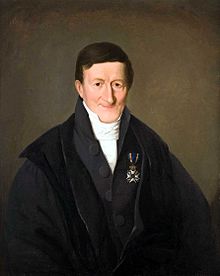Matthijs Siegenbeek
Matthijs Siegenbeek , also: Matthias Siegenbeck , (born June 23, 1774 in Amsterdam , † November 26, 1854 in Leiden ) was a Dutch Reformed theologian , literary scholar and historian .
Life
Siegenbeek comes from German parents of Reformed denomination and remained as the only son after the death of a younger brother. At the age of eleven he attended the Latin school in his birthplace, where he continued his education in German, French and English under the rectorate of Richeus van Ommeren (1757–1796). In doing so, he developed a fondness for poetry and classical literature. After leaving school with a thesis on Carmen etegiacum, Ultima Jacobae Bavarae, morti proximae, verba , he moved to the Athenaeum Illustre in his hometown in 1790 . Here Jean Henri van Swinden in physics and astronomy, Daniel Wyttenbach in classical literature and Diederik Adriaan Walraven (1732–1804) in the oriental languages were his formative teachers. He also studied at the theological seminary in Amsterdam with Jan Konijnenburg (1758–1831), Paulus van Hemert (1756–1825) and Gerrit Jacob Hesselink (1755–1811). His extraordinary knowledge of the Dutch language, literature and poetry was expressed in various scripts.
On June 3, 1795 he completed his theological exam and found a job in his hometown. On March 6, 1796 he received a preaching position in Dokkum . On August 10, 1797, the curators of the University of Leiden appointed him extraordinary professor of speculative philosophy and literature, which he held on September 23, 1797 with the speech Over het openbaar onderwijs in de Nederduitsche welsprekendheid (freely translated: On public education in Dutch rhetoric ). On May 31, 1799 he was appointed full professor in the same field, which he took on on September 28, 1799 with the treatise PC Hooft beschouwd als Dichter en geschiedschryver (freely translated: Pieter Corneliszoon Hooft described as a poet and historian ). After he had given the laudation Jani Dousae as rector of the Alma Mater in 1809/10 , he was also given the professorship of modern literature on March 5, 1811. When the Leiden University was reopened after the Wars of Liberation , he received confirmation of his professorships, was again Rector of the University in 1823/24 with the articulated treatise Laurentio Petro Spiegetio and was retired on July 3, 1844.
Siegenbeek had made significant contributions to the development of Dutch spelling . In 1801 he was commissioned by the Dutch Ministry of Education to write a uniform spelling. This was published in 1804 under the title Verhandeling over den invloed der welluidendheid en gemakkelykheid van uitspraak op de spelling der nederduitsche taal and was introduced on December 18, 1804 as the first official Dutch spelling rule. This foundation of the Dutch spelling history was underpinned in the following year with the Woordenboek voor de nederduitsche spelling (freely translated into German: dictionary for the Dutch language). From his spelling rule, for example, the ij , which is typically used today in Dutch, is striking, which largely replaced the letter y , which was often used at the time . In addition, his historical research and biographies of his contemporaries are a rich archive for exploring historical contexts.
In 1800 he became a member of the Society of Sciences in Haarlem , in 1803 a member of the Dutch Society of Literature , 1805 a member of the Society of Arts and Sciences in Utrecht and in 1808 the Royal Netherlands Academy of Sciences . He was also a member of the Society for Linguistics and Poetry in Zealand and Friesland , as well as the literary societies in Antwerp, Ghent, Bruges, Brussels and Batavia . In addition, he was made Knight of the Dutch Lion by the King and an honorary member of the Society of Dutch Literature.
Works (selection)
- Negotiating over de spelling of the Nederduitsche taal, ter bevordering van eenparigheid in dezelve. 1804 ( online ); 1810, ( online )
- Woordenboek voor de nederduitsche spelling. 1805 ( online )
- Museum, of verzameling van stukken ter bevordering van fraaije kunsten en wetenschappen. 1812 ( online )
- Buttoned divorce is the Dutch letterkunde. 1826 ( online )
- Divorce of the Leidsche Hoogeschool van hare oprigting in den jare 1575 tot het jaar 1825. 1829, 1st volume ( online , online , online , online ), 2nd volume ( online ), 1832 2nd volume ( online )
- Redevoeringen en negotiating over onderwerpen, tot de vaderlandsche divorced en letterkunde behoorende. 1836 ( online )
- Verslag van de Verhooren door Johan van Oldenbarnovelt ondergaan in the afdeelingen. 1849 ( online ),
- The divorce of burger wrapping in Nederland. 1851 ( online )
- Proeven van Nederduitsche poetry uit de zeventiende eeuw. 1856
literature
- Abraham Jacob van der Aa : Biographical Woordenboek der Nederlanden. Verlag JJ van Brederode, Haarlem, 1874, vol. 17, part 2, p. 662 ( online , Dutch)
- L. Knappert: SIEGENBEEK (Matthijs) . In: Philipp Christiaan Molhuysen , Petrus Johannes Blok : Nieuw Nederlandsch Biografisch Woordenboek . (NNBW), AW Sijthoff's Uitgevers-Maatschappij publishing house, Leiden, 1921, vol. 5, col. 231 (Dutch)
Web links
| personal data | |
|---|---|
| SURNAME | Siegenbeek, Matthijs |
| ALTERNATIVE NAMES | Siegenbeck, Matthias |
| BRIEF DESCRIPTION | Dutch Reformed theologian, literary scholar and historian |
| DATE OF BIRTH | June 23, 1774 |
| PLACE OF BIRTH | Amsterdam |
| DATE OF DEATH | November 26, 1854 |
| Place of death | Suffer |
